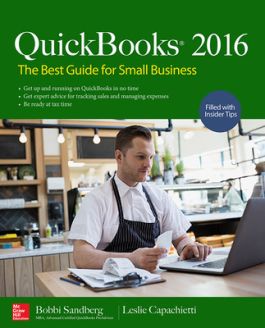QuickBooks 2016: The Best Guide for Small Business
Step 1. Download Adobe Digital Editions Both PC and Mac users will need to download Adobe Digital Editions to access their eBook. You can download Adobe Digital Editions at Adobe's website here.
Step 2. Register an Adobe ID if you do not already have one. (This step is optional, but allows you to open the file on multiple devices) Visit account.Adobe.com to register your Adobe account.
Step 3: Authorize Adobe Digital Editions using your Adobe ID. In Adobe Digital Editions, go to the Help menu. Choose “Authorize Computer.”
Step 4: Open your file with Adobe Digital Editions. Once you’ve linked your Adobe Digital Editions with your Adobe ID, you should be able to access your eBook on any device which supports Adobe Digital Editions and is authorized with your ID. If your eBook does not open in Adobe Digital Editions upon download, please contact customer service
I Getting Starting Using QuickBooks
1 Using QuickBooks for the First Time
2 The Chart of Accounts
3 Entering Your Customers
4 Entering Your Vendors
5 Creating Items for the Products or Services that You Sell
6 The Other Lists that You May Need
7 Entering Your Starting Balances
8 Setting Up Users and Permissions
II Completing the Most Common Tasks in QuickBooks
9 Invoicing Your Customers
10 Applying Customer Payments to Invoices
11 Tracking and Paying the Bills for Your Business
12 Managing Your Bank and Credit Card Accounts
13 Balancing Your Accounts Using the QuickBooks Reconciliation Window
14 Printing, E-mailing, and Managing Documents in QuickBooks
III Other Tasks Your Business May Need To Do in QuickBooks
15 Using QuickBooks to Manage Your Inventory
16 Using Online Banking
17 Entering Special Transactions in QuickBooks Using the General Journal Entries Window
18 Preparing Your QuickBooks Data for Year End
IV Tracking Time and Paying Your Employees
19 Keep Track of the Time Your Employees Work Using QuickBooks Time Sheets
20 Paying Your Employees with QuickBooks Payroll
21 Using QuickBooks Payroll to Track and Remit Payroll Liabilities
V Sharing, Securing and Customizing Your QuickBooks Data
22 Ways to Save and Share Your QuickBooks Information with Others
23 Keeping Your QuickBooks Data Secure and Healthy
24 Customizing QuickBooks for Your Business
VI Understanding Your Business with QuickBooks Reports
25 The Most Common Reports and Why They're Important
26 Creating and Customizing Reports
27 Using the QuickBooks Budget and Planning Tools
A Installing QuickBooks on Computers that are Networked
B The Most Common Mistakes QuickBooks Users Make… and How to Avoid Them
Set up a complete small business financial management system quickly and easily. Written by Certified QuickBooks ProAdvisors, QuickBooks® 2016: The Best Guide for Small Business shows you how to maximize all of the desktop software’s powerful capabilities, including the new and improved features for 2016.
From processing invoices to managing payroll, you will learn how QuickBooks Desktop versions help you control your business’s financial operations. Sprinkled throughout the book are tips for tracking inventory, monitoring sales, and much more. In addition, get recommendations for working with an accountant and organizing tax information. Run your small business efficiently and effectively using the tested techniques and valuable advice in this practical guide to QuickBooks Desktop 2016
- Tailor QuickBooks Desktop to meet your company needs
- Customize entries for customers and vendors
- Make Items work for you
- Control bank and credit card accounts
- Pay your employees and payroll taxes with ease
- Understand the built-in budget and planning tools
- Manage inventory for your company
- Protect your data
- Create dynamic reports
- Breeze through year-end and tax time

